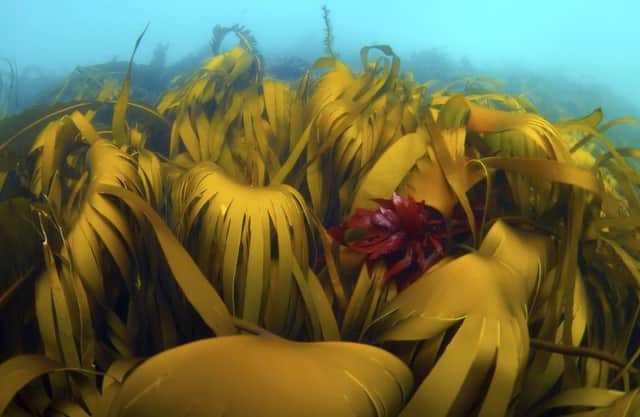Kelp harvest will destroy ecosystem, says expert


An Ayr firm has sparked controversy after seeking a licence from the Marine Scotland civil service directorate to harvest kelp off the west coast using specially adapted boats.
Marine Biopolymers (MBL) claims that over six years, it could harvest up to 33,800 tonnes per year of the seaweed Laminaria hyperborea, a large, leathery brown kelp.
Advertisement
Hide AdAdvertisement
Hide AdIt has proposed a range of sustainability measures, including allowing harvested beds to recover for five year spells.
But critics of its plans include the esteemed naturalist, Sir David Attenborough, who said it was vital Scotland’s kelp forests were protected.
Now, Professor Juliet Brodie, a merit researcher at the Natural History Museum, has warned that if the firm’s application is greenlit, it would have a ruinous impact on the wider marine ecosystem and risk the erosion of coastlines.
Brodie, who has spent decades studying the seaweeds of Britain, said she was “heartbroken” upon learning of the application by MBL.
She said kelp forests around Britain are as large as broadleaved land forests, and are some of the most productive ecosystems on the planet, supporting a variety of other seaweeds and animals, and serving as nurseries for Atlantic cod and pollock.
Brodie explained: “Kelp forests are unique and precious. Mechanical removal of kelp from the seabed will destroy this unique habitat. There will be no nurseries for fish, no protection of our coasts and the world will be a poorer place. We need to wake up to the destruction of these ecosystems before it is too late.”
MBL’s plans, the first of their kind in Scotland, include harvesting entire kelp plants, including their holdfasts, which house a host of different species, including worms, molluscs, and anemones, which in turn serve as food sources for fish and mammals such as seals and otters.
Brodie added: “We know from our work at the museum that this species is also threatened by climate change in the south of Britain. These Scottish populations of kelp are doing well at the moment, which could be an indication that they are resistant to the effects of warmer waters, making them even more vital to protect.”
Advertisement
Hide AdAdvertisement
Hide AdHowever, David Mackie, co-founder of Marine Polymers, said the firm was “greatly alarmed” by some of Brodie’s remarks.
He said: “Her comments reflect a complete lack of scale or proportionality in relation to the matters she raises and create an acutely false picture of both the reality and what MBL is proposing in its scoping report.
“We have consistently stated – and remain consistent – that our proposal is to harvest one specific type of brown kelp, in specific areas off the west coast of Scotland, in a sustainable and eco-supportive method.
“The 30,000 wet tonnes of Laminaria hyperborea that we are seeking to harvest each year, represents just 0.15 per cent of the overall stock – leaving 99.85 per cent untouched and not, as she states, ‘destroying a unique habitat’.”
Mackie added: “Her reference to there being no protection of Scotland’s coasts completely ignores our clear statement that there will be no harvesting near vulnerable coastlines.”
Last month, Attenborough became the most high profile conservationist to speak out against MBL’s wild seaweed harvesting initiative, insisting it was “absolutely imperative” kelp forests are safeguarded.
He said: “It is perfectly possible to harvest them sustainably by removing their fronds while leaving the rest of the plant intact.
“But dredging – or indeed any kind of harvesting that removes the whole plant – is a wholly shortsighted measure that risks the wholesale devastation of our kelp beds.”